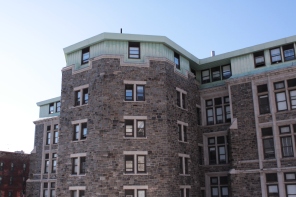
The recent bias incident in Finlay Hall underscores the importance of students’ right to feel safe on campus. (Ram Archives)
By Matthew Michaels
Those who argue that safe spaces are part of a liberal agenda propagated by the “PC-police” unwittingly argue for people to feel unsafe. Safe spaces have historically been places where groups of people with common characteristics can join together and feel secure in the environment because they feel insecure in the larger general community. Safe spaces have been misinterpreted and the definition and purpose have been misaligned by the media, but the root issue and purpose remain.
The Fordham community was shaken up by a bias incident almost as soon as the school year commenced. On Sept. 3, residents of Finlay Hall woke up to find a message on their white board that was quite clearly offensive and intolerable. Our community cannot allow vicious attacks like those seen far too often — harassment of a group of people that serves to destroy our community.
As a resident assistant and a university tour guide, I know as well as anybody that Fordham encourages the use of the term “residence halls” in lieu of the near-ubiquitous “dorms.”
The school rightly believes, based on the Latin root of the word, that a dormitory is a mere place to sleep. By contrast, a residence hall is a place to live, to grow and to develop into men and women for others. In other words, a residence hall is a temporary home, and a home is a place where residents feel the utmost security. The development of character Fordham expects from its students cannot occur as long as any of us feel unsafe in our homes.
On tours, I often get the dreaded safety question: “Do students feel safe off campus?” What anxious parents should be asking is if students feel safe from on-campus abuse by those who make up our community. When one person in our community is threatened, we are all threatened. A home ceases to be a home. No person should feel unsafe at home.
Many people do not see the need for safe spaces because they do not feel unsafe. Those people are forgetting about the members of marginalized and historically repressed groups who do not feel safe. If you felt unsafe, you would appreciate safe spaces.
A common critique of safe spaces is that it coddles the minds of young adults. But I, and most advocates for safe spaces, agree that all college students should indeed be challenged. Making safe spaces around sexual orientation, religion or race is not preventing students from being challenged: it is preventing them from being harassed. Within the framework of safe spaces, students can simultaneously be safe and challenged. However, people should ever be challenged about something which they have no control over, such as their sexual orientation or skin color.
Maslow’s hierarchy of needs is one of the simplest and most well-known psychological theories, and it helps support the concept of safe spaces. The hierarchy is a pyramid with the most basic needs at the bottom and each level cannot be reached until the previous one is satisfied. Safety is second to the bottom as one of the most basic needs of the human experience, right after physiological needs such as air and water.
Without safety, members of our society are limited and will not reach other needs, like belonging and self-actualization. The lack of safe spaces would inhibit millions of Americans from reaching their full potential as they are stuck fighting for their own safety, something so many of us take for granted.
Safe spaces are likewise protected by Fordham’s Jesuit value of cura personalis. They promote the well-being of the whole person, mind and body. St. Ignatius would say that safe spaces are required to care for the whole person, and the entire society benefits from them.
The idea of safe spaces is that they provide vulnerable members of community with environments where they can be themselves while advancing the national conversation to progress and be more accepting. Safe spaces do not prohibit anybody’s freedom of speech. They protect people from being verbally assaulted from vitriolic bigots spewing venomous messages meant to incite harm and pain.
Fordham can sometimes be prone to a feeling of exceptionalism, but recent events have proven we are vulnerable to the same issues as any college campus. I have always been impressed with the student response to bias incidents like the one this month. However, condemning hateful actions after they occur is not enough. We must remember that if we do not make room for safe spaces on campus, there will be more incidents, and more students will be targets of hate, leading to a community where far too many are unsafe.
Matthew Michaels, GSB ’17, is a marketing major from Hightstown, New Jersey.
